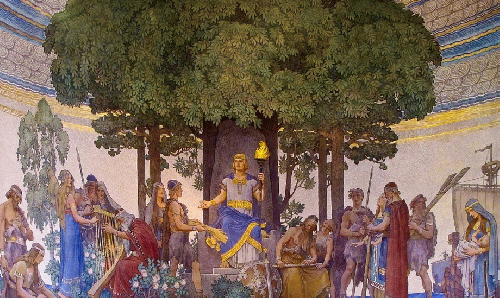Orientation
My three-year stint in the New Age
In 1984 at the age of 36, I decided to return to school with the intention of becoming an art therapist. I attended Antioch University in San Francisco for my undergraduate degree and then went to a New Age spirituality school the following year for my master's degree (California Institute of Integral Studies). At the time, Carl Jung, Mircea Eliade, and Joseph Campbell were treated as if they were gods. On the surface, it seemed like a good fit for me. After all, as an art therapist I could work with images, and Jungians were all about images. I was attracted to the prospect of making images not as art-for-art's-sake, but in the service of spirituality or even pagan magic. Mircea Eliade was the guru of comparative religion. He wrote a 3-volume set on A History of Religious Ideas and, like Jung, he thought modern life was a degeneration from ancient or even tribal times. Most likeable of all was Joseph Campbell. I mean watching him on Bill Moyers, what's not to like? I was thrilled by the sweep of his Hero with a Thousand Faces and I read his four-volume comparative mythology. I read all these books before I re-entered college, so I knew exactly what I was getting into. But there was a fly in the ointment. I was (and am) a materialist Marxist and had no intention of giving that up. Plus, I went to school in very conservative times, five years into Reagan's two terms of presidencies. It wasn't until later that I realized how politically conservative Jung, Eliade and Campbell actually were. Further, thanks to Robert Ellwood's book The Politics of Myth, I realized that they were all anti-Communist as well. This article is about Ellwood's book. Besides Ellwood, other sources for this article are The Jung Cult and the Aryan Christ, both by Richard Noll.
Why was right-wing mythology attractive in post-World World II Yankeedom?
After World War II, there was an upsurge of interest in mythology in the United States. Why was this? Mythology is typically associated with time periods that are prior to the 19th century - the Greeks, the Romans, or the Renaissance. It seemed that the philosophy of the Enlightenment had buried mythology as another indicator that the days of conventional religion, magic and storytelling was over. But the industrialization process, along with two world wars and the rise of fascism, seemed to put a damper on Enlightenment dreams for Europe. Not only this, but myth was used by European countries throughout the 19th centuries to build nationalist sentiments to fuel the war. Myth was an expression of the connection between collective humanity (not individuals) and an animated spiritualized nature (not inert). Myth is experienced through imagination, intuition, poetic stories, and rites. There was an anti-Christian, anti-Jewish strain since both these mainstream religions were modernist and rejected myth for history. "Now we see where history has led us", the mythologists might say. If the modern world was fallen, the shortest road to paradise might lead backward to the Middle Ages, the ancient world or even to tribal societies.
It is completely understandable that Europeans might be drawn to myth because of the casualties, whether or not they won or lost the war. After all, these mass murders were achieved with modern weapons. But why would myth become popular in the United States that was on the winning side of the war and had suffered few causalities comparatively speaking? All three mythologists developed a following in the United States. In addition, the United States was anti-communist in the 1950s. Communism was associated with the "progress" orientation of the modern world. Why would the Yankee population reject both liberal modernity and communist modernity? The answer is that it was only the upper and upper-middle classes in Yankeedom that was enthralled with mythology. The middle and working classes were satisfied with their traditional religions.
Is myth inevitably associated with the right wing?
A second issue worth discussing is the politics of myth. All three mythologists we study - Jung, Eliade and Campbell - were associated with the extreme right. Why is this? Is there something about socialism that makes it less possible to use mythology? Some may say that the further to the left you go on the political spectrum the more skeptical people become about religion or mythology. But Jung, Eliade, and Campbell would argue that myth is not a stage of social evolution, nor does it occupy a particular place on the political spectrum. They would say myth is a set of rites and stories present in all societies. If we take this to be true, that will mean myth would be operative across the entire political spectrum. In other words, it doesn't explain why the left has not used myth more.
Commonalities Among Post-World War II Mythologists
Condemning the secular Enlightenment
All three mythologists had major problems with the beliefs and institutions of modernity. They each thought Enlightenment secularism, empiricism, and rationality was responsible for the sad shape the world was in during their time. Jung thought that without spiritual institutions, the darker side of humanity runs rampant. He believed that this is true because this dark side is not sublimated through spiritual practices such as ritual enactments and mythic storytelling. The two world wars were the result of the collective unconscious run amok. Were people in touch with their mythological roots, and brought them to life regularly, they would not act them out in wars.
Western science is guilty of hubris
All mythologists implicate science in the state of the world because science is guilty of hubris in thinking that humanity can chart its own course. Quantitative measurement, statistics, probability, rationality, and objectivity took the heart and soul out of life. Personal experience, storytelling, use of imagination, and appreciation of mystery were left high and dry in this type of world.
The Jewish nature of capitalism
Next Page 1 | 2 | 3 | 4 | 5 | 6 | 7
(Note: You can view every article as one long page if you sign up as an Advocate Member, or higher).






